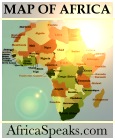Whither Mother Africa?
Posted: Wednesday, May 21, 2003by Kim Johnson, Trinidad Guardian
Listening to the radio only while driving means that you catch little more than snippets in-between navigating the potholes, dodging the maxis, answering the cell, and keeping an eye on what the children are bickering about now in the back seat.
Accordingly, I can only tell you something African is coming up, African Liberation Day or African History Month or some such.
Well, both prompt the same question: what is happening to Africa?
If it's African Liberation Day, then: when and how will Africa be liberated?
And from whom?
If it was African History Month, the issue is the same because Africa seems to be far along the road to a withdrawal from history, or at least from the 21st century.
Either way, the reality is the same: African nations are rapidly becoming irrelevant to the rest of the world, except perhaps as a market for guns.
Barring nuclear extinction, there can hardly be a more tragic scenario than that of a tyrannised people sliding into starvation, to the indifference of everybody else.
It means becoming the world's vagrant, like the ones who sleep on the pavement, dirty, hungry, sick, while passersby go about their business, stepping over without noticing the humanity sprawled there like so much rubbish.
People want to liberate Iraq from Saddam Hussein, they trying Slobovan Milosovec for war crimes in former Yugoslavia, they worried about what North Korea going to do with its nuclear weapons, they glad India and Pakistan back on speaking terms.
But Zimbabwe is only a problem when the white farmers are attacked.
Here we have people who could talk all day about how great Egypt was. And as if we didn't produce enough on our own, we import a few every year to give a lecture or two.
Yet I am yet to hear anyone weep for an Africa racked by war, genocide, corruption, disease, famine, child slavery, environmental destruction and repressive dictatorship.
Of Africa's 700 million people, half live on less than US$1 a day. About 40 million face famine.
In Ethiopia and Eritrea, while eight to 12 million are starving, their leaders use aid money to fight a war that has already claimed 70,000 lives. That scenario can be found all over. The Sudanese have been fighting a civil war for 20 years. There are wars in Angola, Sierra Leone, Congo, Congo-Brazzaville, Somalia. In Burundi, 300,000 were killed in theirs. The Ivory Coast, after decades of peaceful child slavery, has now joined the club.
In some places, the State has been destroyed by corruption and warfare, in that it cannot provide any amenities whatsoever – not water, infrastructure, policing, laws. Think of Mogadishu in Black Hawk Down.
In other countries, almost a quarter of their people are HIV-positive. Of the world's 36 million infected with Aids, 23 million live in Africa. Those countries will be depopulated of productive adults.
Africa's poverty, sickness, and social disruption are not like the Ethiopian famine of 1974. This is something new. It is the catastrophe of people who will never recover economically and will permanently need aid.
And no one bats an eyelid.
Apartheid has been destroyed so it's no longer news that there are on average 59 murders a day in South Africa, 145 rapes and 752 serious assaults. Babies are sometimes raped. Twelve per cent of the population is HIV-positive.
What's to be done?
Traditional explanations offer no solution. Colonialism, Western exploitation, racism, globalisation, foreign aid, debt crisis are all contributory. But they're external causes, and the solutions must be found internally.
If colonialism drew boundaries between States that exacerbated tribal antagonisms, only Africans can re-draw them.
Yet, among the first resolutions of the Organisation of African Unity was to keep the old boundaries, and in the 40 years of independence, they haven't budged an inch.
If things are to be changed, the responsibility lies with Africans to change them. Nelson Mandela, great as he is, cannot do it by himself.
If leaders are corrupt, then Africans must remove them. When King Mswati III of Swaziland buys a private jet for £28 million, while 22 per cent of the population have HIV and the Government's health budget is £12.6 million, remove him.
Excuses can no longer be made for South Africa's Thabo Mbeki, who thinks HIV does not cause AIDS; or for Robert Mugabe, who has destroyed the once-prosperous Zimbabwe; or Namibia's Sam Nujoma who, like Mswati, has a private jet while ruling over one of the poorest countries in the world; and on and on.
This isn't a case of blaming the victim, because the victims are ordinary African people, whereas the perpetrators are the tiny political and educated elites.
South Korea lagged behind Kenya 50 years ago, but is now a developed country, while you can't drive from Nairobi to Mombasa. Why? It's not race but political culture. Everywhere has corruption but, in most other places, it still allows development.
There's a cynical joke about two young men who become friends at university in Europe, an Asian and an African. Afterwards they return to their homes and careers.
Years later, the African visits his friend, who proudly shows off his ten-bedroom house, swimming pool, Lexus. The African congratulates his success and the Asian smiles and points at a highway in the distance.
"See that?" says the Asian with a wink: "Ten per cent."
Next year, the Asian visits his friend and is taken to his house. It is much grander than the Asian's: 36 bedrooms, two pools, a fleet of Mercedes.
"Gosh, you've done well!" exclaims the Asian.
The African smiles, points outside to the dense jungle, and says with a wink: "One hundred per cent."Printer friendly version
Send page by E-Mail

Previous Page | Zimbabwe Watch | Historical Views | Home
NOTICE: All articles are the copyright property of the writers. In accordance with Title 17 U.S.C., section 107, some material on this site is provided without permission from the copyright owner, only for purposes of criticism, comment, scholarship and research under the "fair use" provisions of federal copyright laws. Visit: http://www.law.cornell.edu/uscode/17/107.shtml for more details. If you wish to use copyrighted material from this site for purposes of your own that go beyond 'fair use', you must obtain permission from the copyright owner.










